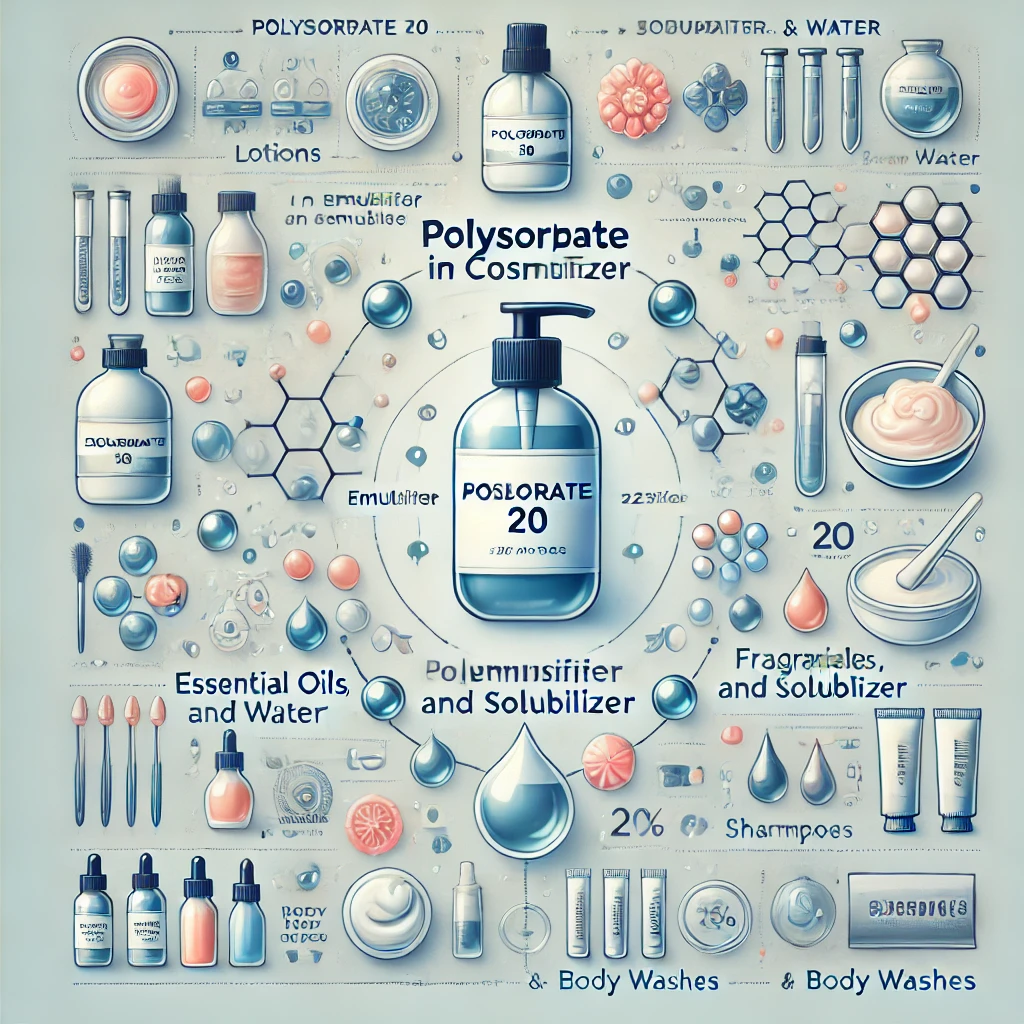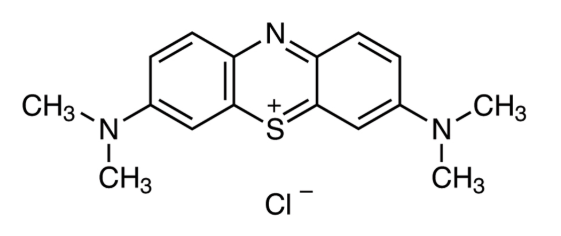The Versatile Uses and Benefits of Polysorbate 20 Across Industries
Abstract
Polysorbate 20 is a versatile and widely used compound that plays an essential role across various industries, including cosmetics, food, pharmaceuticals, and household products. As a non-ionic surfactant, Polysorbate 20 is valued for its ability to act as an emulsifier and solubilizer, enabling smooth blending of water and oil-based ingredients. In cosmetics, it enhances the texture and stability of products like lotions, shampoos, and creams. In the food industry, it ensures uniform emulsions in products such as salad dressings, ice cream, and beverages. In pharmaceuticals, Polysorbate 20 stabilizes formulations and improves the solubility and bioavailability of active ingredients. Additionally, it plays a significant role in household and industrial applications, including cleaning products, lubricants, paints, and agricultural formulations. Known for its mild nature, Polysorbate 20 is safe for use in both consumer and industrial products, though its concentration must be carefully controlled to avoid irritation. This guide highlights the multifaceted uses and safety of Polysorbate 20, emphasizing its importance as a crucial ingredient in everyday products.
Introduction
Polysorbate 20 is a versatile and widely used compound found in various industries, including cosmetics, food, pharmaceuticals, and household products. As a non-ionic surfactant, Polysorbate 20 is primarily known for its ability to act as an emulsifier and solubilizer. It enables the smooth blending of water and oil-based ingredients, making it an essential component in many formulations. Whether it’s helping essential oils dissolve in water-based products, stabilizing the texture of lotions, or improving the consistency of food items, Polysorbate 20 plays a key role in ensuring product stability and performance.
In addition to its technical functions, Polysorbate 20 is known for its mild nature, which makes it suitable for a wide range of applications, including those for sensitive skin and delicate formulations. With its ability to enhance both the effectiveness and safety of products, Polysorbate 20 has become a staple ingredient in modern product development.
This guide will explore the various uses of Polysorbate 20 across different industries, providing insight into its multifaceted role in everyday products. Whether you’re interested in the cosmetic benefits or its importance in food and pharmaceuticals, this post will highlight why Polysorbate 20 is so indispensable.
Polysorbate 20 in the Cosmetics Industry
Polysorbate 20 plays a crucial role in the cosmetics industry due to its unique ability to act as an emulsifier and solubilizer. An emulsifier is a substance that helps oil and water-based ingredients blend together, which is essential for the smooth texture of various cosmetic products. Polysorbate 20 facilitates the stable integration of essential oils, fragrances, and active ingredients into formulations, ensuring that these substances remain uniformly distributed throughout the product. This makes it indispensable in lotions, creams, serums, shampoos, and body washes.

In cosmetic formulations, Polysorbate 20 improves the stability and texture of products, making them more aesthetically pleasing and easier to apply. It prevents separation of ingredients, which can lead to inconsistent product performance. For example, in facial cleansers or body lotions, Polysorbate 20 helps incorporate oils like jojoba oil or lavender oil into water-based formulas without causing irritation. Its solubilizing properties also allow the dispersion of hydrophobic substances (such as fragrances and essential oils) in water, creating a more balanced and effective product.
Beyond just emulsification, Polysorbate 20 enhances the overall performance of personal care products. In shampoos, for instance, it ensures a smooth application and better spreadability, while in moisturizers, it contributes to a light texture that doesn’t feel greasy on the skin. Its mild nature makes it suitable for use in sensitive skin formulations, enhancing consumer satisfaction.
With its versatility, Polysorbate 20 has become a staple ingredient in the formulation of various cosmetic and personal care products, ensuring both efficacy and safety for a wide range of consumers.
Polysorbate 20 in the Food Industry
Polysorbate 20 is commonly used in the food industry, primarily as an emulsifier and stabilizer in various food products. Its main function is to help oil and water-based ingredients blend smoothly, which is essential for creating stable and consistent food products. Polysorbate 20 is often found in items such as salad dressings, sauces, ice cream, and beverages, where it helps maintain a uniform texture and prevents the separation of ingredients.

One of its primary uses in food production is in the creation of smooth emulsions. In products like mayonnaise and dressings, Polysorbate 20 ensures that oil and vinegar or water-based ingredients mix effectively without separating over time. In ice cream and other frozen desserts, it aids in improving texture by preventing ice crystal formation, leading to a creamier and smoother product. Additionally, Polysorbate 20 is used to disperse flavor oils or colorants evenly throughout food and beverages, ensuring a consistent taste and appearance.
In beverages, especially those containing essential oils or flavoring agents, Polysorbate 20 ensures that the ingredients are properly solubilized in the liquid, enhancing the overall product quality. It is also commonly used in the formulation of low-fat or fat-free products, where it compensates for the absence of natural emulsifiers from fats.
As a generally recognized as safe (GRAS) ingredient by the U.S. Food and Drug Administration (FDA), Polysorbate 20 has been widely accepted in the food industry, though it is used in low concentrations to ensure that it does not affect the taste or nutritional content of the final product.
Polysorbate 20 in the Pharmaceutical and Healthcare Sectors
Polysorbate 20 is a versatile ingredient widely used in the pharmaceutical and healthcare industries due to its ability to improve the solubility and stability of various drug formulations. As a surfactant, Polysorbate 20 helps solubilize hydrophobic drugs and enhances their bioavailability. This property makes it particularly important in injectable medications, where it ensures that active pharmaceutical ingredients (APIs) remain evenly dispersed within the formulation.

In vaccines, Polysorbate 20 is often employed to stabilize the active ingredients and prevent aggregation of proteins, ensuring the efficacy and safety of the vaccine over time. Its role as a stabilizing agent extends to other biologics, including monoclonal antibodies and peptide-based drugs. By maintaining a stable formulation, Polysorbate 20 helps improve the shelf life and performance of these critical medications.
In addition to its use in injectables, Polysorbate 20 is commonly used in oral formulations, including liquid medicines and suspensions, where it ensures the uniform distribution of active ingredients, improving consistency and ease of administration. Its mild nature makes it suitable for use in both adult and pediatric formulations, reducing the risk of irritation.
Despite its benefits, the use of Polysorbate 20 in pharmaceuticals must be carefully regulated, as excessive amounts could lead to side effects such as irritation at injection sites or hypersensitivity reactions. Nonetheless, when used within approved limits, Polysorbate 20 remains a valuable ingredient in the formulation of effective and stable pharmaceutical products.
Polysorbate 20 in Household and Industrial Applications
Polysorbate 20, commonly known for its use in the food, cosmetic, and pharmaceutical industries, also plays a crucial role in various household and industrial applications. In the realm of household cleaning products, Polysorbate 20 serves as an emulsifier and surfactant. It helps to break down oil and grease, making it easier to clean surfaces. Whether in dishwashing liquids, all-purpose cleaners, or surface disinfectants, Polysorbate 20 ensures that the formulation spreads evenly and effectively, enhancing the cleaning action. It also contributes to the stability of these products by preventing the separation of ingredients over time.

In industrial settings, Polysorbate 20 is used as a dispersing agent in products such as lubricants, paints, and coatings. Its ability to improve the uniform distribution of particles within these products enhances their performance. For instance, in paints and coatings, Polysorbate 20 helps to achieve a smoother finish by preventing pigment clumping and ensuring consistent texture throughout the product. It is also utilized in industrial cleaners, where its emulsifying properties help break down oils, waxes, and other hard-to-remove substances, improving cleaning efficiency.
Another notable industrial use of Polysorbate 20 is in the formulation of agricultural products. It is used as a dispersing agent in pesticide formulations, ensuring that active ingredients are evenly distributed and effectively absorbed by plants. This contributes to the overall effectiveness of pesticides and herbicides, enhancing crop protection while reducing the environmental impact of excessive chemical use.
Polysorbate 20’s versatility across household and industrial sectors demonstrates its widespread utility, ensuring its continued relevance in various non-consumer-facing applications as well.
Benefits and Safety of Polysorbate 20
Polysorbate 20 offers numerous benefits across various industries, particularly due to its effectiveness as an emulsifier, solubilizer, and stabilizer. In cosmetics, it helps create smooth, uniform textures in lotions, shampoos, and creams by blending water and oil-based ingredients seamlessly. Its ability to dissolve hydrophobic substances, like essential oils and fragrances, enhances the quality and performance of personal care products. In the food industry, Polysorbate 20 ensures that ingredients in dressings, ice creams, and beverages remain evenly distributed, preventing separation and improving texture.
Beyond its functionality, Polysorbate 20 is known for its mildness, making it suitable for sensitive skin formulations. Its low irritation potential makes it a preferred choice in products designed for delicate skin types. Additionally, Polysorbate 20 is considered safe for consumption and topical use, as it is approved by regulatory bodies like the FDA as a GRAS (Generally Recognized As Safe) ingredient in food products.
However, despite its safety, it is essential to use Polysorbate 20 in recommended concentrations. Excessive use may cause skin irritation or allergic reactions in some individuals. As with all ingredients, it’s crucial to follow proper guidelines to ensure optimal safety and efficacy.
Conclusion
Polysorbate 20 is a highly versatile and indispensable ingredient used across a wide range of industries. Whether it’s enhancing the texture and stability of cosmetics, improving the consistency of food products, or ensuring the effectiveness of pharmaceutical formulations, Polysorbate 20 plays a vital role in making everyday products work seamlessly. Its ability to act as an emulsifier, solubilizer, and stabilizer makes it an essential component in numerous formulations, ensuring that ingredients blend smoothly and remain well-distributed over time.
In conclusion, the continued importance of Polysorbate 20 across diverse industries underscores its role as a key ingredient that ensures product quality, stability, and safety. Its versatility and effectiveness make it an essential component in modern formulations, enhancing the performance of a wide range of products that consumers rely on daily.
References
Ogulur I, Yazici D, Pat Y, Bingöl EN, Babayev H, Ardicli S, Heider A, Rückert B, Sampath V, Dhir R, Akdis M, Nadeau K, Akdis CA. Mechanisms of gut epithelial barrier impairment caused by food emulsifiers polysorbate 20 and polysorbate 80. Allergy. 2023 Sep;78(9):2441-2455. doi: 10.1111/all.15825. Epub 2023 Aug 2. PMID: 37530764.
https://onlinelibrary.wiley.com/doi/full/10.1111/all.15825
Li J, Zeng C, Guan J, Suryanarayanan R. Effect of surfactants on lactate dehydrogenase aqueous solutions: A comparative study of poloxamer 188, polysorbate 20 and 80. Int J Pharm. 2024 Aug 15;661:124374. doi: 10.1016/j.ijpharm.2024.124374. Epub 2024 Jun 21. PMID: 38909927.
https://pubmed.ncbi.nlm.nih.gov/38909927/
Glücklich N, Carle S, Diederichs T, Buske J, Mäder K, Garidel P. How enzymatic hydrolysis of polysorbate 20 influences colloidal protein stability. Eur J Pharm Sci. 2023 Dec 1;191:106597. doi: 10.1016/j.ejps.2023.106597. Epub 2023 Sep 26. PMID: 37770006.
https://pubmed.ncbi.nlm.nih.gov/37770006/
Tilghman C, Li SK, Spaulding LA. Micellar solubility and co-solubilization of fragrance raw materials in sodium dodecyl sulfate and polysorbate 20 surfactant systems. Int J Cosmet Sci. 2025 Apr;47(2):321-335. doi: 10.1111/ics.13032. Epub 2024 Nov 12. PMID: 39533516.



